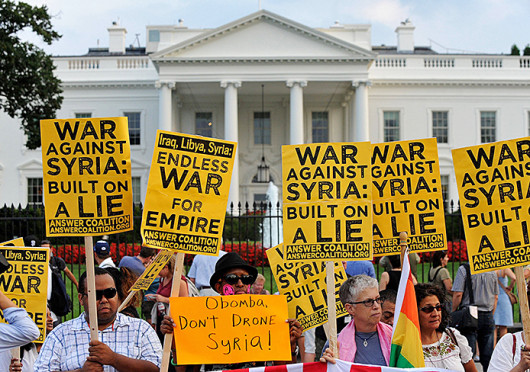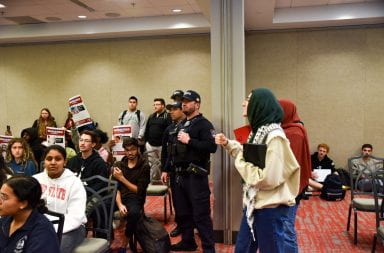
Demonstrators rally on the north side of the White House in Washington, D.C., to protest any US military action against Syria Aug. 29. Credit: Courtesy of MCT
No matter how you slice it, intervening in a civil war between splintered and divided rebels and a totalitarian regime that more than likely used chemical weapons on civilians, doesn’t have any clear, guaranteed outcomes.
President Barack Obama understood this complexity when he delivered an address Saturday on how the U.S. should respond to the actions overseas. With confidence Bashar Hafez al-Assad used chemical weapons and with confidence the United Nations would not be able to pass a resolution, Obama announced he is prepared to authorize limited air strikes on Syrian military compounds to preserve the dignity of international law. Although prepared to authorize the strikes himself, for the moment, Obama wants to defer any action to a vote in Congress when it reconvenes Sept. 9 following its summer recess.
Pressure has been mounting on some kind of intervention from the U.S., U.N. and western European countries. Intervention, however, is a vague word. In reality, there are many different options, for intervention in Syria, but none of them are completely sound.
Some Ohio State students, such as Rose Denzer, a first-year in pharmaceutical sciences, said are unsure of how things would transpire.
“I think the United States should be involved, but I don’t know exactly on what level,” Denzer said.
David Fraley, a first-year in mechanical engineering, showed concern about the lack of clear options.
“I don’t think (the U.S.) knows enough to start a military action. If we do commit to military action, there needs to be a game plan, an exit strategy,” Fraley said. “The United States should wait for the United Nations to come up with an answer on what to do.”
One option is just to put boots on the ground, but Obama is opposed to this option. The U.S. can send in troops to overthrow Assad, and end the civil war, but as we have seen in other countries (such as Iraq), overthrowing a government doesn’t necessarily end the fighting.
It is not enough simply to take out someone in power and walk away. Committing to a war means committing to nation-building after that war. For the U.S. to march on Assad and then leave, would actually be much worse than not doing anything at all. As unstable as Syria is now, it will be much worse if the U.S. creates a power vacuum.
Sending more troops to the Middle East is the last option on a lot of people’s list of options concerning Syria. The U.S. has been fighting wars in the Middle East since 2001 and is in the process of withdrawing troops from the region.
The next option then, which Obama is ready to sanction, is to strategically bomb different Syrian military sites. Though this is less of a troop obligation, and less of a monetary obligation, it isn’t foolproof. It still commits the U.S. to creating a more stable Syria after shaking it up, which requires time and money from a country that is exhausted from Middle Eastern affairs both militarily and monetarily. Despite the cons, Brandon Balogh, a fourth-year in communication, said he thinks this is the best option.
“I think the United States should use limited tactical strikes, because the odds of the U.N. coming to a resolution are slim,” Balogh said.
Even if the Assad regime is somehow ousted from power, with or without help from the United States, there’s no way to guarantee that Assad’s removal is the best thing for Syrians, or the U.S. There aren’t just two sides to this civil war — it isn’t just the rebels versus Assad. The Syrian rebels come in all shapes and sizes, from moderate non-sectarians, to radical, extremist hardliners. The rebels are varied and fragmented, according to different beliefs, funding and organization.
To implement a government friendly to the U.S., and other western powers, more than strategic bombing or deploying troops will be needed. What not may be as obvious is how the U.S. would be perceived in doing so, even if America has support from other countries. A simple look back to Iraq will tell anyone the U.S. is not always seen as a liberator — in fact, nation building in a post-Assad Syria will require that the U.S., U.N., or whomever is involved pick and chose those who do and those who do not get power. “The West,” the U.N., or the U.S. — however the interveners are perceived — will be seen as the enemy to whatever violent group is not in power and will be their next target.
The best way to come off as fair in acting on Syria would be to wait for a U.N. resolution. This would mitigate the feelings of unfairness caused in realigning the Syrian government, as the decision would come from a recognized, international governance. However, Obama, and many OSU students for that matter, seem to have little faith in the U.N. Quite frankly, a U.N. resolution is not likely to come with China and Russia as permanent members of the U.N. Security Council. Neither China nor Russia have governments that champion human rights, so when many countries want to use that reason as justification for going into Syria, we can keep expecting the vetoes to roll in. Add in the fact that Russia has lucrative arms deals with Syria, and holds a position that going into Syria would violate international law, a U.N. resolution is all but impossible.
If the U.S. decides to take some course of action, the Arab League — comprised of 21 Arab states including Saudi Arabia, Iraq and Egypt — does not support any U.S. intervention in Syria.
But doing nothing about Syria isn’t necessarily a good thing, either. Obama suggested doing nothing allows the Syrian government would make a mockery of international law and human rights. Letting an oppressive, violent regime continue is certainly not in anyone’s best interest, except, of course, for Assad I suppose. If the U.S. or other western nations have no say in which rebels take power, there is no guarantee that the next government will be any better — neither for Syrian civilians nor the U.S. and its allies. Whether we like it or not, the U.S. is too big and powerful of a country to use isolationism as a strategy when it comes to world affairs.
The best thing that the U.S. can do is to have support and consensus in whatever it decides — whether that consensus is simply congressional or international. No option is foolproof and it’s going to come down to deciding which choice outweighs the others. For Obama, it’s air strikes. Whether that decision is echoed by an official U.N. sanction, or an organized coalition with countries in Europe, the U.N. cannot handle the intervention, or the aftermath, on its own.


